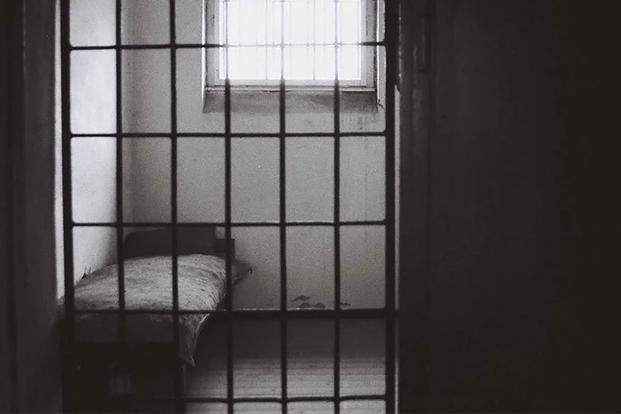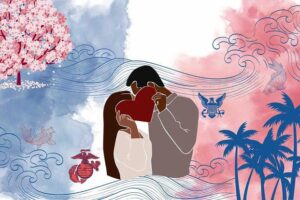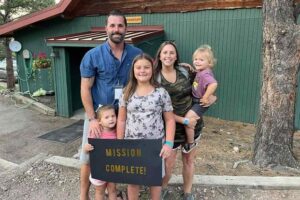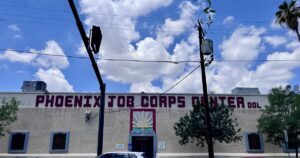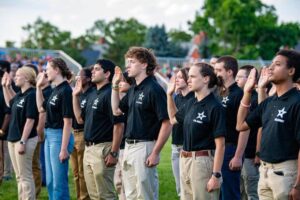Editor’s Note: This story was published in partnership with San Quentin News and was written during a writing seminar for incarcerated veterans in April hosted by The War Horse at California’s San Quentin Rehabilitation Center. Tens of thousands of military veterans are incarcerated across the United States, and these stories are intended to shine a light on their unique needs, challenges, and experiences. Learn about the seminar here.
Finding Brotherhood Behind Bars
Arriving at San Quentin Rehabilitation Center, I shuffled forward in waist chains and leg irons, feeling the metal bite into my Achilles with each step. The correctional officer’s voice boomed, “You SNY? GP? EOP?” I was clueless, following the person ahead, lining up against a wall, and shedding my clothes as ordered, feeling as exposed as the day I was born.
The experience echoed my first day of Marine Corps boot camp, shifting into survival mode, listening intently, and blending in. As I was directed to Tank 6, the heavy door slammed, bringing on a wave of claustrophobia. The silence was broken by a fellow inmate’s query, “Hey, you active? Where you from?” Recognizing the gang-related terminology, I hesitated. Before I could respond, two large Hispanic men approached, and a violent encounter ensued. Despite my Marine training in violence of action, I was overpowered. It was my first day at San Quentin, but not my first experience with prison.
* * *
Growing up in Placentia, California, during the 1980s, life was carefree until one night in 1987. My father assaulted my mother and sisters. The police soon intervened, and my father was arrested. My siblings and I were taken to a shelter for abused children, where I was separated from my sisters.
In high school, I joined the Marines Junior R.O.T.C., finding purpose and discipline under a strict instructor. This led to a four-year service in the Marines, where I thrived on the structured military lifestyle. However, unresolved childhood trauma morphed into adulthood turmoil.
* * *
Inside San Quentin, I reverted to basic survival strategies learned during Marine boot camp: take it day by day, meal by meal. My cell was a tight space, barely allowing me to extend my arms fully. The view of the bay through the bars was a distant reminder of the outside world.
My vocabulary shifted to prison vernacular—classes were “programs,” therapy became “groups,” and meals were “chow.” Time slipped by, and in 2023, I returned to San Quentin, where I met a fellow Marine. He invited me to a veterans meeting, a gathering of incarcerated veterans who met weekly. Despite the usual prison racial divisions, this group transcended those barriers, focusing on shared military experiences.
At one meeting, I introduced myself, “Noah Winchester, United States Marine Corps,” receiving affirmations from fellow Marines. This camaraderie felt like a comforting embrace. I dedicated myself to this community, wanting to extend that warmth to others.
As part of the Veterans Group at San Quentin, members wear distinct royal blue hats, personalized with military insignia. I gave a hat to an inmate who rarely engaged with others, noticing a change when he proudly wore it the next day. “It feels good,” he said, smiling. In him, I saw a reflection of brotherhood.
Within the confines of San Quentin, thirty years after losing my family, I discovered a new one.
This War Horse reflection was edited by Kristin Davis, fact-checked by Jess Rohan, and copy-edited by Mitchell Hansen-Dewar. Hrisanthi Pickett wrote the headlines.
Editors Note: This article first appeared on The War Horse, an award-winning nonprofit news organization educating the public on military service. Subscribe to their newsletter.
© Copyright 2025 The War Horse. All rights reserved. This material may not be published, broadcast, rewritten or redistributed.

